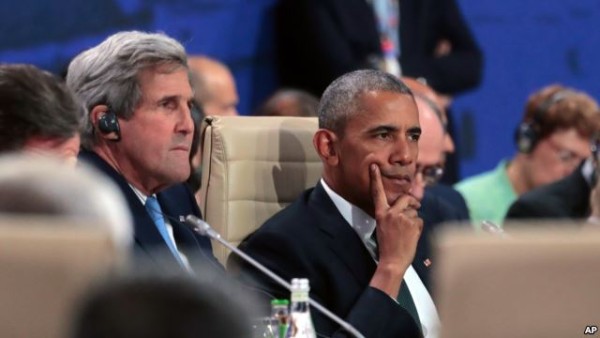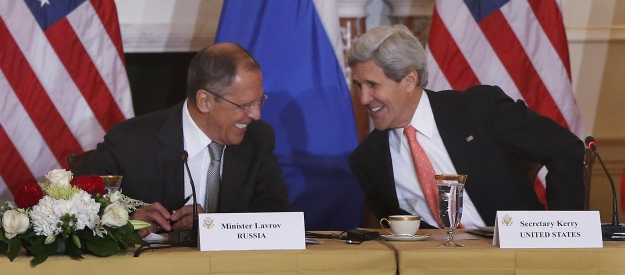PHOTO: Russian Foreign Minister Sergei Lavrov and US Secretary of State John Kerry share a laugh
Concern is growing within the Obama Administration — as well as among activists and Syria’s opposition — that Secretary of State John Kerry is now following the line of Russia, the key ally of the Assad regime.
The specific catalyst for the latest criticism is a comment last month by Kerry, at the Aspen Ideas Festival in Colorado, about efforts to “reach an understanding” with Moscow. Speaking of the approach to the Islamic State and the jihadists of Jabhat al-Nusra — both of whom were excluded from a now-dormant February 27 agreement to cease hostilities — Kerry expanded the possible list of “terrorist” groups to include rebel factions:
There are a couple of subgroups underneath the two designated groups of] Daesh and Jabhat al-Nusra. [There are] Jaish al-Islam, Ahrar al-Sham particularly — who…alongside these other two sometimes…fight the Assad regime.
Jaish al-Islam and Ahrar al-Sham are two of the largest rebel organizations, and the former is also part of the opposition-held High Negotiations Committee.
Russia has long pressed for both to be listed as “terrorist”. The designation would rationalize Moscow’s thousands of airstrikes against opposition-held territory — including civilian sites — since September, under the cover of a necessary assault on the rebels.
Two administration officials working on Syria policy said Kerry’s naming of the two factions is potentially harmful to the Administration’s efforts to convince the Russians and the Syrian regime to halt airstrikes on rebels and opposition territory.
“For months, we’ve been arguing to make sure the Russians and the Syrian regime don’t equate these groups with the terrorists,” one senior administration official said. “Kerry’s line yields that point.”
Another official e-mailed, “Baffled. SMH[Shaking my head].”
The Battle Over Policy
However, the wider context for the rising concern appears to be a heated debate ending in a notable shift in US policy, proposing cooperation with the Russians on some operations inside Syria.
The policy debate was spurred by the breakdown of the Geneva talks, held intermittently since 2014, seeking discussions between the Assad regime and the opposition-rebel bloc for a political resolution. The latest round of negotiations between January and April collapsed as President Assad rejected any possibility of a transitional government, and as the regime continued bombing and sieges of opposition territory.
The failure was a personal setback for Kerry. Since autumn 2013, when President Obama had overruled his desire — and that of most of his advisors — for an intervention to protect Syria’s civilians after the Assad regime’s chemical attacks near Damascus, the Secretary of State had tied himself to initiatives with the Russians. He was committed to completion of an agreement by the end of Obama’s Presidency, telling officials in late 2015 that he wanted the result by the end of March.
As a February 27 “cessation of hostilities” broke down, with Russia and the Assad regime stepping up airstrikes, Kerry and the Administration had to confront that they had no Plan B.
Into the void stepped 51 State Department officials who have worked on the Syrian crisis. In a “dissent channel cable”, leaked last month to the media, they suggested that Washington now had to put pressure on Assad, rather than waiting for the Russians to do so, to get a political advance. They proposed targeted airstrikes and support for some rebel factions, demonstrating to the regime that it could not continue obstruction of negotiations.
While not endorsing the memorandum, Kerry said it was a “very good” document. He met some of the authors in what was seen as an implicit endorsement of the plan.
But the White House was even quicker to blunt the ideas. They derided the officials by saying that none were high-level and pointedly remarked that Obama would not accept the memorandum.
A few days later, those White House advisors regained the initiative. They informed selected journalists that Obama had approved a proposal for coordinated airstrikes with Moscow against the Islamic State and Jabhat al-Nusra.
On Thursday, John Kerry arrives in Moscow to discuss the offer with President Vladimir Putin.

Secretary of State Kerry and President Obama at the NATO Summit in Warsaw, July 8, 2016
Relying on Moscow
Of course, the White House is not framing the proposal as a capitulation to Russia’s support of Assad. It is saying that Russia will use its influence to halt bombing by the Syrian Air Force, as Washington and Moscow try to restart the political talks.
State Department spokesman John Kirby said Kerry is “extremely frustrated…and that’s one of the reasons why we’re going to Moscow, to see if that change is actually going to be possible — if the Russians are going to do what they’ve said they were going to do”.
Those who are sympathetic with the rejected memorandum of the 51 State Department staff are not convinced. “We do this, and then what?” said one of several US officials who voiced objections:
You need to solve the Assad problem, because as long as Assad is in power, Syria is a failed state. And as long as it’s a failed state, it will be a breeding ground for extremists.
The critical officials noted that Obama’s proposed deal does not affect regime or Russian ground operations and does nothing to move Assad to accept negotiations.
Those officials can also add that Russia has shown no sign of adherence to previous agreements. Having put out false or misleading information for months about its airstrikes on opposition territory — including civilian sites — Moscow did not fulfil the “cessation of hostilities” that it brokered in late February, let alone force Assad to do so.
Instead, the regime and Russia have stepped up attacks, especially since mid-April, from the northwest to the south of Syria. As well as striking rebels, the warplanes of Moscow and Damascus have bombed hospitals, civil defense centers, clinics, markets, schools, bakeries, a water treatment plant, and other infrastructure, killing hundreds of civilians.
Some leading analysts of Syria are now saying that Kerry is actively working with Russia to prop up the Syrian President:
Obama admin is pro-Asad, full stop. https://t.co/uN7ruFb9lO
— Thomas Pierret (@ThomasPierret) July 12, 2016
The Reality of US “Leverage”
The line of Kerry’s supporters in the Administration, as expressed by The Washington Post, is that “any downside to cooperation with Russia would be mitigated by the pressure Moscow could bring on Assad and gains against an al-Nusra organization that remains a vital component of al-Qaeda’s international operations”.
Yet, even accepting that view rather than those of Kerry’s critics, the Secretary of State — whose projections for a March resolution have long vanished — is operating on a tenuous assumption. With Obama rejecting any possibility of US leverage over Assad, Kerry is counting on Russia to fill that gap.
But there is no incentive for Moscow to do so. President Putin and Foreign Minister Lavrov might give lip service to cooperation. However, the reality is that Russia can play out the clock on the Obama Administration, while continuing to work with the regime on military operations.
I don't think #Kerry has figured out that #Russia is just going to wait him out on #Syria – No need to deal before a new Admin comes in
— Scott Lucas (@ScottLucas_EA) July 12, 2016
In the past week, as Kerry has prepared for his trip, that Russian strategy has been vividly illustrated in an Orwellian juxtaposition. While hailing a series of 72-hour “ceasefires” proclaimed by the Syrian military, Russian warplanes have enabled that same military and allied foreign militias make significant gains north of Aleppo, threatening to cut off the opposition in Syria’s largest city.
Rather than acknowledge the duplicity, State Department spokesman Kirby insisted that “violence has markedly reduced”.
To admit otherwise would expose the true situation for Kerry, now that Obama has again vetoed any effective action to press Assad.
The US does have leverage, but it is leverage with the Syrian opposition.
For a moment in early February, Kerry pulled back the curtains in a blunt statement to three Syrian activists. He said, “Basically, it was the opposition that didn’t want to negotiate and didn’t want a ceasefire.” Then he said that he anticipated three months of bombing during which time “the opposition will be decimated”.
The Secretary of State can only get his desired settlement if the opposition-rebel bloc gives way, since there is no prospect that Assad will do so.
His trip to Moscow — and Obama’s proposal that will be discussed there — are part of the diplomatic dance to both cover up that reality and to help make it occur.
John Kerry, September 1, 2013: “Bashar al-Assad now joins the list of Adolf Hitler and Saddam Hussein who’ve used these [chemical] weapons in a time of war.”

